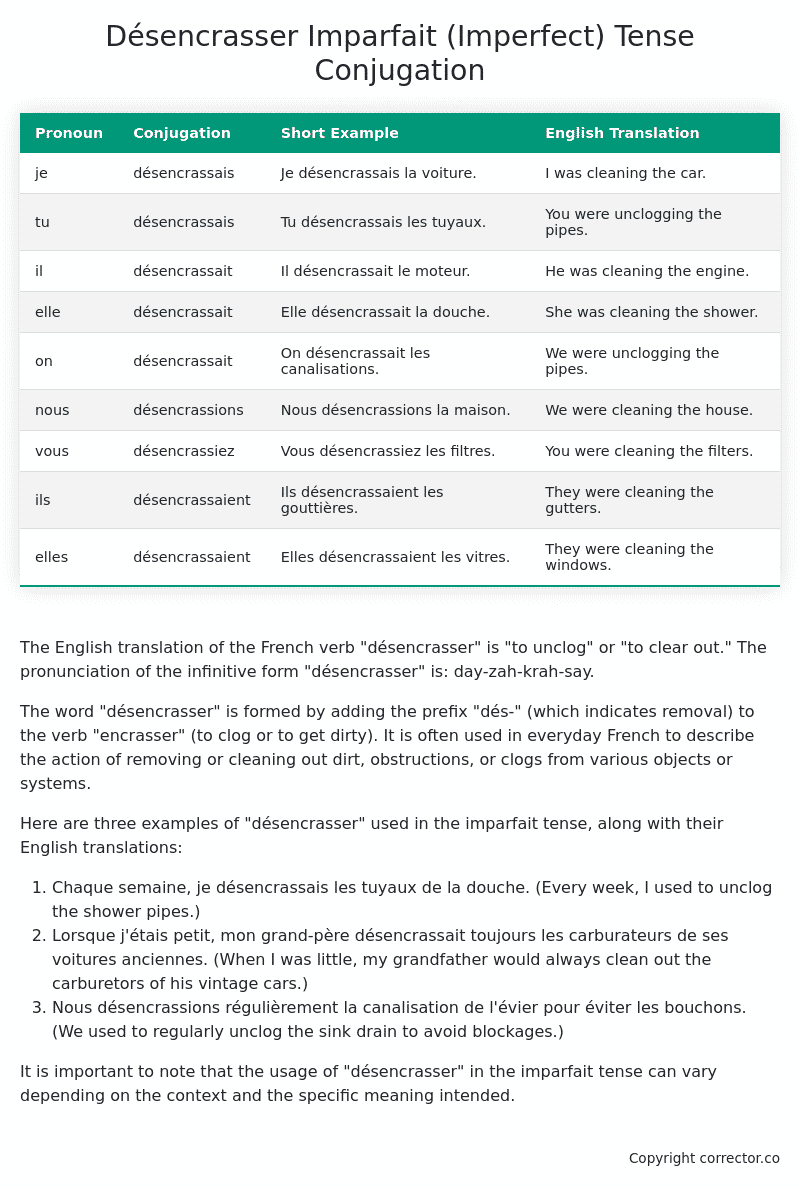Imparfait (Imperfect) Tense Conjugation of the French Verb désencrasser
Introduction to the verb désencrasser
The English translation of the French verb “désencrasser” is “to unclog” or “to clear out.” The pronunciation of the infinitive form “désencrasser” is: day-zah-krah-say.
The word “désencrasser” is formed by adding the prefix “dés-” (which indicates removal) to the verb “encrasser” (to clog or to get dirty). It is often used in everyday French to describe the action of removing or cleaning out dirt, obstructions, or clogs from various objects or systems.
Here are three examples of “désencrasser” used in the imparfait tense, along with their English translations:
- Chaque semaine, je désencrassais les tuyaux de la douche. (Every week, I used to unclog the shower pipes.)
- Lorsque j’étais petit, mon grand-père désencrassait toujours les carburateurs de ses voitures anciennes. (When I was little, my grandfather would always clean out the carburetors of his vintage cars.)
- Nous désencrassions régulièrement la canalisation de l’évier pour éviter les bouchons. (We used to regularly unclog the sink drain to avoid blockages.)
It is important to note that the usage of “désencrasser” in the imparfait tense can vary depending on the context and the specific meaning intended.
Table of the Imparfait (Imperfect) Tense Conjugation of désencrasser
| Pronoun | Conjugation | Short Example | English Translation |
|---|---|---|---|
| je | désencrassais | Je désencrassais la voiture. | I was cleaning the car. |
| tu | désencrassais | Tu désencrassais les tuyaux. | You were unclogging the pipes. |
| il | désencrassait | Il désencrassait le moteur. | He was cleaning the engine. |
| elle | désencrassait | Elle désencrassait la douche. | She was cleaning the shower. |
| on | désencrassait | On désencrassait les canalisations. | We were unclogging the pipes. |
| nous | désencrassions | Nous désencrassions la maison. | We were cleaning the house. |
| vous | désencrassiez | Vous désencrassiez les filtres. | You were cleaning the filters. |
| ils | désencrassaient | Ils désencrassaient les gouttières. | They were cleaning the gutters. |
| elles | désencrassaient | Elles désencrassaient les vitres. | They were cleaning the windows. |
Other Conjugations for Désencrasser.
Le Present (Present Tense) Conjugation of the French Verb désencrasser
Imparfait (Imperfect) Tense Conjugation of the French Verb désencrasser (You’re reading it right now!)
Passé Simple (Simple Past) Tense Conjugation of the French Verb désencrasser
Passé Composé (Present Perfect) Tense Conjugation of the French Verb désencrasser
Futur Simple (Simple Future) Tense Conjugation of the French Verb désencrasser
Futur Proche (Near Future) Tense Conjugation of the French Verb désencrasser
Plus-que-parfait (Pluperfect) Tense Conjugation of the French Verb désencrasser
Passé Antérieur (Past Anterior) Tense Conjugation of the French Verb désencrasser
Futur Antérieur (Future Anterior) Tense Conjugation of the French Verb désencrasser
Subjonctif Présent (Subjunctive Present) Tense Conjugation of the French Verb désencrasser
Subjonctif Passé (Subjunctive Past) Tense Conjugation of the French Verb désencrasser
Subjonctif Imparfait (Subjunctive Imperfect) Tense Conjugation of the French Verb désencrasser
Conditionnel Présent (Conditional Present) Tense Conjugation of the French Verb désencrasser
Conditionnel Passé (Conditional Past) Tense Conjugation of the French Verb désencrasser
Conditionnel Passé II (Conditional Past II) Tense Conjugation of the French Verb désencrasser
L’impératif Présent (Imperative Present) Tense Conjugation of the French Verb désencrasser
L’impératif Passé (Imperative Past) Tense Conjugation of the French Verb désencrasser
L’infinitif Présent (Infinitive Present) Tense Conjugation of the French Verb désencrasser
L’infinitif Passé (Infinitive Past) Tense Conjugation of the French Verb désencrasser
Le Participe Présent (Present Participle) Tense Conjugation of the French Verb désencrasser
Le Participe Passé (Past Participle) Tense Conjugation of the French Verb désencrasser
Struggling with French verbs or the language in general? Why not use our free French Grammar Checker – no registration required!
Get a FREE Download Study Sheet of this Conjugation 🔥
Simply right click the image below, click “save image” and get your free reference for the désencrasser imparfait tense conjugation!

Désencrasser – About the French Imparfait Tense
NOTE: To take a deep dive into all the French tenses then see our article on Mastering French Tense Conjugation.
Formation of the Imparfait Tense
For regular -er verbs:
For regular -ir verbs
For regular -re verbs
Common Everyday Usage Patterns
Description of Past Habits
Background Information
Mental and Emotional States
It’s employed to express emotions, thoughts, or physical sensations in the past. For example: “J’étais content quand il est arrivé.” (I was happy when he arrived.)
Ongoing Actions
Points to Note About the Imparfait Tense
Passé Composé vs. Imparfait
Conditional
Si Clauses
Narration
I hope you enjoyed this article on the verb désencrasser. Still in a learning mood? Check out another TOTALLY random French verb imparfait conjugation!


